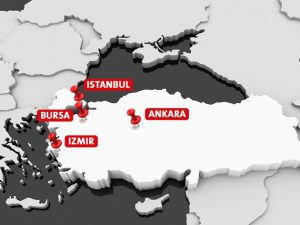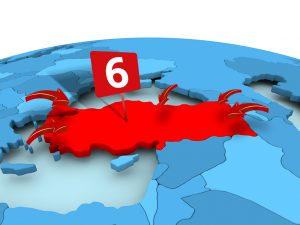
Last Real Estate Reports
2012-2019 Real Estate Report
The Turkish real estate sector has grown significantly in recent years thanks to many effective reasons. Implementing the law of Abolishment of Reciprocity in 2012, which allows foreigners to buy properties, has an important role in increasing the foreign demand on Turkish real estate. Furthermore, the tax cuts, which is related to the housing sector also has encouraged investments in the housing market till 2018 the real estate market faced a recession which pushed the Turkish government to take 6 major actions to recover the real estate market in Turkey
- The central bank Dropped the bank interest rates from 24% to 14% and still decreasing.
- The U.S. dollar/Turkish lira exchange rate became constate at 5.6/5.7 rate after reaching 7 TL last year.
- The private and state banks provide housing loans with around 0.8 percent and 1 percent interest rates, which is very good to revive the construction sector.
- The demand for houses became much better compared to the rates 1-1.5 years ago.
- The country eased the citizenship conditions for foreigners last year by reducing real estate worth limit to $250,000, which increased the foreign demand by 19%
- Turkey’s contractors are pursuing significant projects in African countries, Qatar, Russia, and the Turkic republics.
Residential Market
 In the recent ten years, the residential market has witnessed a high growth arises from the population growth and the effect of rural-urban migration. Istanbul, Ankara, Bursa, and Izmir are considered primary markets, which account for the highest demand in Turkey. The demand for the residential sector is determined by many factors such as price, location, and size.
In the recent ten years, the residential market has witnessed a high growth arises from the population growth and the effect of rural-urban migration. Istanbul, Ankara, Bursa, and Izmir are considered primary markets, which account for the highest demand in Turkey. The demand for the residential sector is determined by many factors such as price, location, and size.
In 2017, the number of housing units exceeded 32 million; Istanbul alone has the biggest share, which is 5.4 million housing units. Since the law of abolishment of reciprocity entered into force in 2012, residential demand has increased to 12.5%. With the recent depreciation in the Turkish lira, the central bank of Turkey has followed tightening procedures, which reflect a significant rise in mortgage interest rate, which suppressed 36% after it, was within the range of 11% to 17% during the period of 2012-2017.
Due to the high population and the important location in Istanbul, its share of house sales accounts for 18% in 2017. Following, Ankara, Izmir, Antalya, and Bursa with shares 11%, 6%, 5%, and 4% respectively.
Office Market
 Turkey becomes one of the best developing countries, which provides a suitable environment for business. Companies in different fields such as, financial services, IT, construction and media have taken place all over the country, particularly Istanbul, which is considered the economic capital of Turkey. Turkey receives firms from over 90 countries around the world.
Turkey becomes one of the best developing countries, which provides a suitable environment for business. Companies in different fields such as, financial services, IT, construction and media have taken place all over the country, particularly Istanbul, which is considered the economic capital of Turkey. Turkey receives firms from over 90 countries around the world.
Location is one of the most important determinants of the demand of the office market. Having an office close to the metro station is considered a big advantage for companies and their staff. Furthermore, prestigious office buildings, which are equipped with facilities such as, restaurants, sports clubs, and cultural facilities, alongside the physical attributes and size also, can play a key role in attracting firms for their workplaces.
In 2017, the Grade A office stock in Istanbul exceeded 249 office buildings spread over 5.3 million square meters with a growth of 12% since 2010. In terms of the prime rent of office, since 2009, it was within a stable range of $40-$45 per square meter for a month up to the beginning of 2016. However, the prime rent started to decline due to many reasons, a high construction growth, a decrease in global demand in Turkey since 2015, and the recent depreciation of the Turkish lira against the dollar hitting the level of $30 per sq. m/month at the end of 2017.
 Retail Market
Retail Market
The Turkish retail market has increased dramatically over the recent decade. There are many reasons that could explain this significant expansion in the retail market such as population growth, improvement in living conditions, tourism, and high growth rate. Istanbul was the sixth most attractive retail market in Europe, according to the JLL Cross Border retailer attractiveness index in 2016.
The gross leasable area spreads over 12.2 million sq.m in 2017, Istanbul has occupied almost 34.5% of total GLA. Moreover, the retail prime rent witnessed a significant decline from EUR 90 in 2016 to EUR 70 in 2017.
Hotel market
The hotel and tourism market has been affected negatively in the recent few years, due to many political and economic problems. However, Turkey proved its ability to attract passengers from different countries around the world, in which the number of passengers increased to 193 million with a growth of 11% compared to the previous year. In terms of the hotel market supply, Turkey has more than 3640 hotels, 5-star hotels make up 42.7% of the total hotels, while 4-star and 3-star hotels account for 24.8% and 12.6% of the hotel market in 2017.


